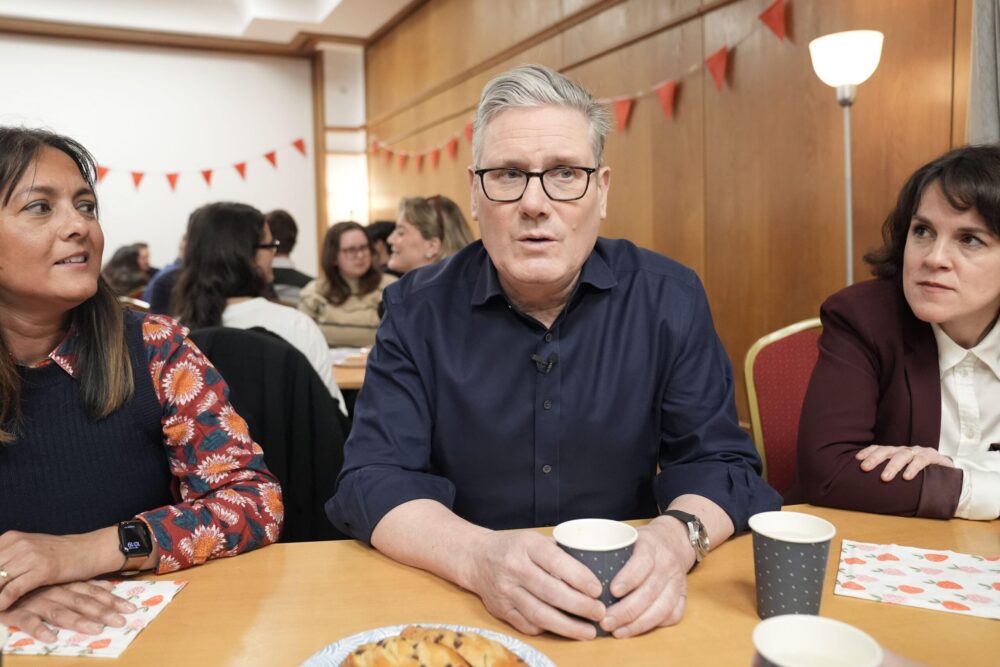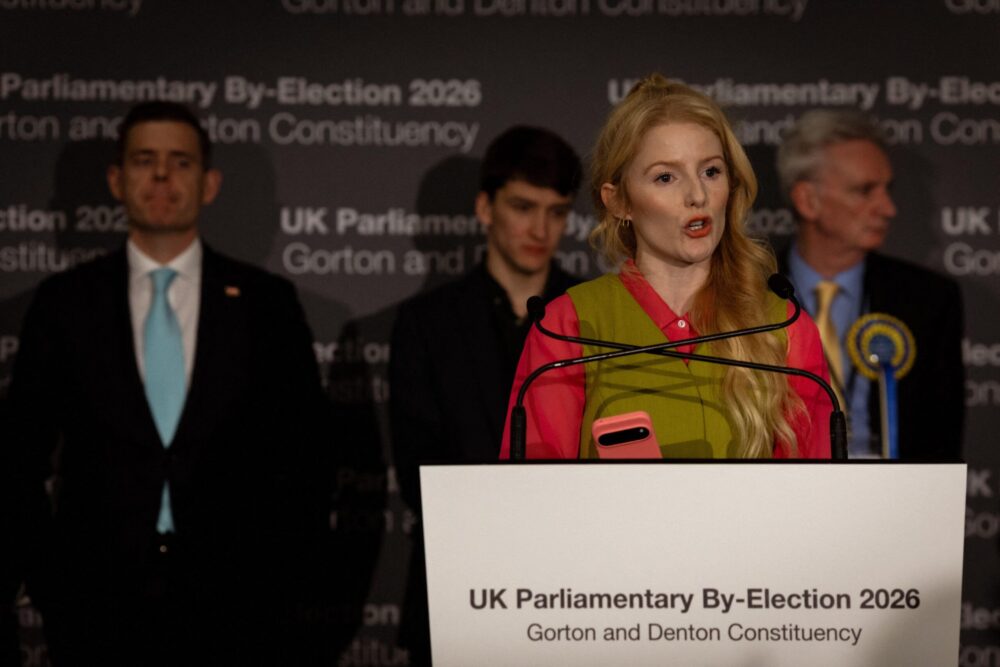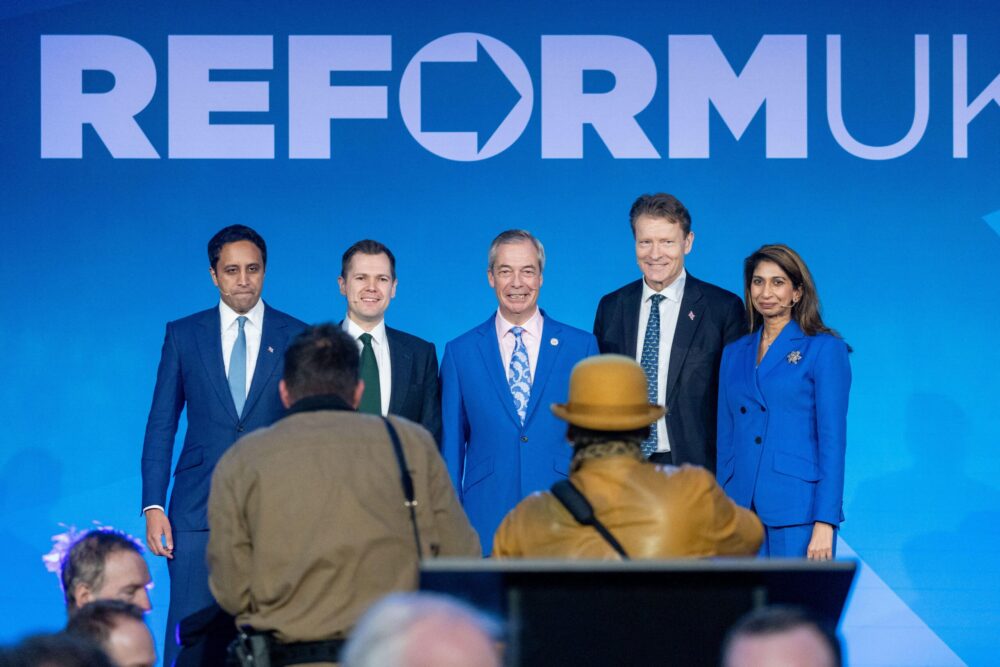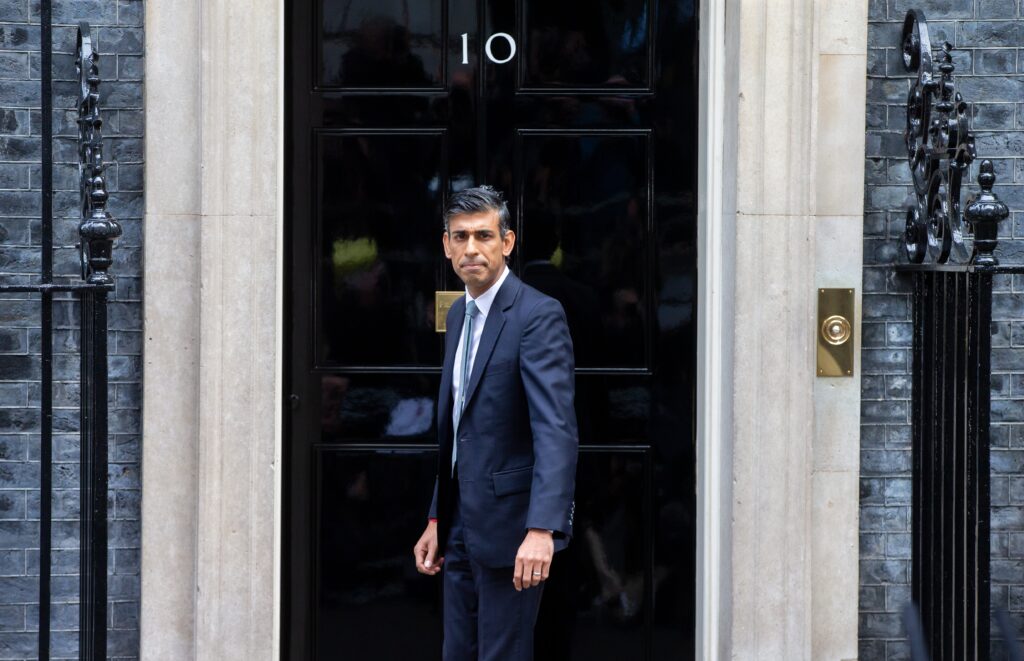
Voters believe four of the government’s five key pledges are more likely to happen under Labour than the Tories. Meanwhile, 2019 Conservative voters prioritise spending on public services over tax cuts and are as likely to say ‘don’t know’ when asked who would make the best PM as to choose Rishi Sunak over Keir Starmer.
These are some of the (rather dismal, from a Tory point of view) findings from the first in a series of monthly polls that I will be running throughout the year. I will be tracking key measures like best prime minister, trust on the economy and intensity of party support, as well as looking at some of the wider questions that voters will be considering as they make up their minds – if they haven’t already. We will also ask what, if anything, voters have noticed recently about what is going on in politics. All the data and analysis will be available at the new-look LordAshcroftPolls.com
Voting intention

Rather than ask them how they intended to vote, we asked how likely they currently thought they were to end up voting for each party on a 100-point scale. Looking at those who give one party a highest score of 50 or above out of 100, we find Labour on 44%, the Conservatives on 27%, Reform UK third on 10%, and the Lib Dems and Greens on 6% each.
We can also see the relative intensity of party support among different kinds of voter. Among 2019 Tories, the mean self-declared likelihood of voting Conservative again is 47/100 (slightly higher for Tory remainers at 50/100 than Tory leave voters at 46/100). This compares to Labour voters’ 68/100 probability of sticking with their party. Those currently leaning towards Reform UK say their support is at least as solid (89/100) as that of those currently favouring the Conservatives (87), Labour (88) or the Lib Dems (84).
Best PM and trust on the economy
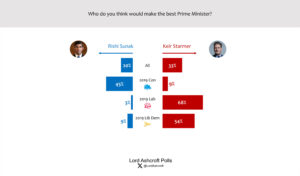
Just 1 in 5 say Rishi Sunak would be the best prime minister, compared to a hardly more commanding 1 in 3 for Keir Starmer – nearly half (47%) say they don’t know. Only just under two thirds (68%) of 2019 Labour voters name Starmer, but 2019 Conservatives are more likely to say they don’t know (46%) than to say Sunak would do the better job (45%).
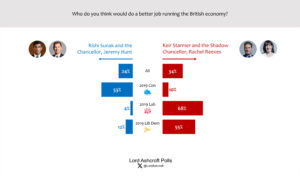
The numbers on who would do a better job running the economy are marginally less bad for the Conservatives: Sunak and Jeremy Hunt trail Sunak and Rachel Reeves by 34% to 24%; the proportion saying ‘don’t know’ (42%) again exceed the numbers naming either team. However, only just over half (53%) of 2019 Conservatives say they think Sunak and Hunt would do a better job than the Labour pair.
Continuity or change?
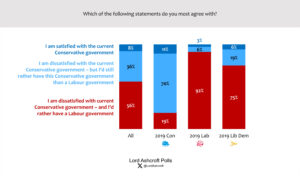
Overall, only 8% of voters say they are satisfied with the current Conservative government (including just over 1 in 10 of those who voted for the party in 2019). A further 36% (including 70% of 2019 Tories) say they are dissatisfied but would still rather have this government than a Labour one. A majority (56%, including 19% of 2019 Tories and two thirds of those leaning towards the Lib Dems) say they are dissatisfied and would rather have a Labour government.
The balance of opinion on this measure, who falls into which category, and whether these things shift during the year will be an important measure of how people see the decision before them. “Satisfied” voters say their mean likelihood of voting Conservative is 50/100, while for those dissatisfied but still preferring the Conservatives to Labour it is just 41/100 – suggesting they are less motivated to go and defend the status quo than those who want change.
Those leaning to Reform UK are the most likely to say they’re dissatisfied with the Tories but would prefer a Conservative government to a Labour one (81%). At the same time, 62% of them say they don’t know who would do a better job on the economy and nearly three quarters (73%) say the same when asked to choose between Sunak and Starmer.
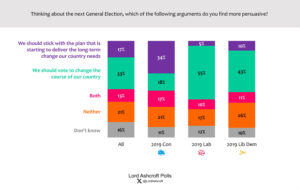
We asked which, if either, of the arguments in the leaders’ New Year messages people found more persuasive – Rishi Sunak’s pitch that “we should stick with the plan that is starting to deliver the long-term change our country needs”, or Starmer’s call to “vote to change the course of our country”. Just 17% found the Sunak proposition the more persuasive, but Starmer’s line did not exactly run away with it – just 33% chose it as the more convincing.
Ominously for the Tories, those leaning towards Reform UK were more likely to choose the message of change (35%) than sticking with the plan (13%), and they were more likely to say neither message was persuasive (28%) than voters as a whole (21%). Those saying they were dissatisfied with the Conservative government but still preferred it to Labour leaned towards sticking with the plan, but not decisively: 31% preferred Sunak’s message and 14% preferred Starmer’s, but 4 in 10 said either that neither was persuasive (24%) or thought there was merit in both (16%).
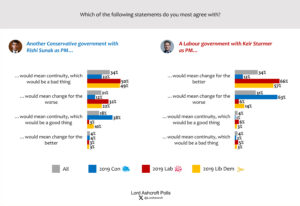
Attempts to frame a new Conservative government as a vote for change look doomed to fail. A quarter of voters say a new Tory government with Sunak as PM would represent change, but most of these (21%) say it would be change for the worse. Just over half say a new Conservative government would mean continuity, but most of these say this would be a bad thing (34%) rather than a good thing (18%). While nearly two thirds (65%) say a Starmer-led Labour government would mean change, people were slightly more likely to say this would be change for the better (34%) than for the worse (31%).
The five priorities
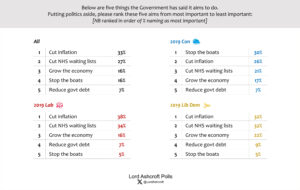
Looking at the government’s longstanding five priorities, we see that voters consider cutting inflation to ease the cost of living as the most important, followed by cutting NHS waiting lists – with the exception of 2019 Conservatives, more of whom ranked stopping the boats as the top priority than the cost of living or the NHS.
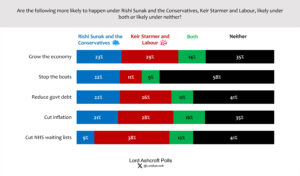
Gallingly for the Tories, voters think four of the five government pledges are more likely to happen under a Labour government than under the Conservatives. The exception is stopping the boats and ending illegal migration: while 22% say this is more likely under the Tories and just 11% under Labour, 58% say it is likely under neither. For Reform UK supporters, stopping the boats is easily the most important of the five priorities, and the one least likely to happen under Labour or the Tories.
The economy, tax, spending and debt
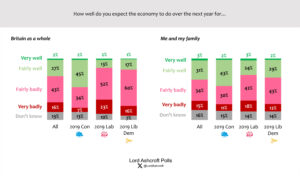
Voters were more likely to be pessimistic than optimistic about prospects for the economy over the next year, though slightly less so for themselves and their families than for the country as a whole. Conservative voters were the only group among whom optimists outnumbered pessimists. Those who said they were dissatisfied with the Tories but preferred them to Labour were evenly divided on both questions.
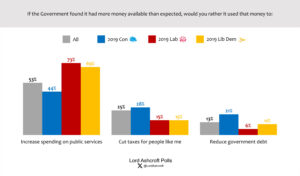
When we asked what should happen if the government found it had more money available than expected, a majority (53%, including 44% of 2019 Tories) said they would like to see higher spending on public services. A quarter overall (25%) said they would rather see the government “cut taxes for people like me”, while 13% said they would like to reduce government debt. Those who voted Conservative in 2019 prioritised spending on public services over tax cuts by 44% to 28%.
Tax cuts were the biggest priority for those leaning towards Reform UK, but only 40% of them chose this option; half chose either higher spending (32%) or debt reduction (18%). Those saying they were dissatisfied with the Conservatives but preferred the Tories to Labour also favoured higher spending over tax cuts by 40% to 30%.
Brexit
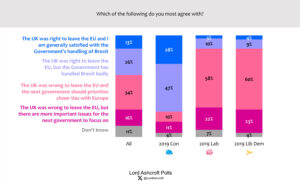
Only 13% said they thought the UK was right to leave the EU and were satisfied with the government’s handling of Brexit. A further 26% said we were right to leave but that the government had handled Brexit badly – including a majority (58%) of 2019 Conservative Leave voters and 75% of those currently leaning towards Reform UK. Around half of voters (including 13% of those who voted Leave) say Brexit was the wrong decision. By around 2 to 1 these voters say the next government should prioritise closer ties with Europe (34%), rather than that there are more important things for the government to focus on. More than half (55%) of those currently leaning towards Labour say the next government should prioritise closer ties.
The leaders in a word
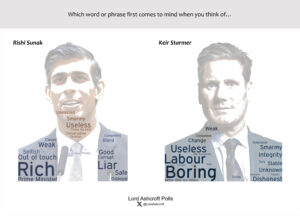
Asking for the first word or phrase that came to mind when people thought of Sunak and Starmer did not produce very flattering responses on either side. In previous similar exercises, choices for Sunak have featured “competent” much more prominently and “liar” much less so. For Starmer, “unsure” has become less prominent but the overall balance of opinion towards him has changed little.
What’s been happening?
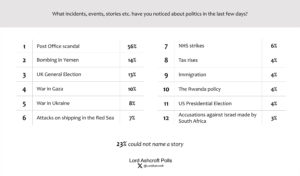
When we asked what political events voters had noticed about politics in the last few days, nearly a quarter (23%) could not name a single one. The most widely remembered story was the Post Office scandal, mentioned by just over half of respondents, followed by air strikes in Yemen. Only 4% mentioned the Rwanda policy, though it should be noted that the survey was completed before this week’s parliamentary drama.
The political map
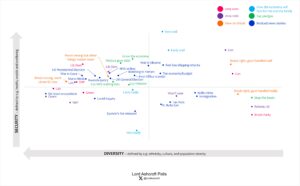
Our political map shows how different issues, attributes, personalities and opinions interact with one another. Each point shows where we are most likely to find people with that characteristic or opinion; the closer the plot points are to each other the more closely related they are. Here we see that the centre of gravity of Conservative support has shifted from its 2019 position away from the less prosperous, Brexit-backing bottom right quadrant into more traditionally Tory territory. Those who see stopping the boats as the most important of Sunak’s five pledges, think Brexit was the right decision but that the government has handled it badly, have noticed recent stories on immigration and crime, and who are leaning towards voting for Reform UK are most likely to be found in this corner of the map.
People who mentioned stories on Israel, Gaza and Rwanda, who see Brexit as a mistake and intend to vote Labour or Lib Dem are most likely to be found in the more prosperous but liberal-leaning top left quadrant.
